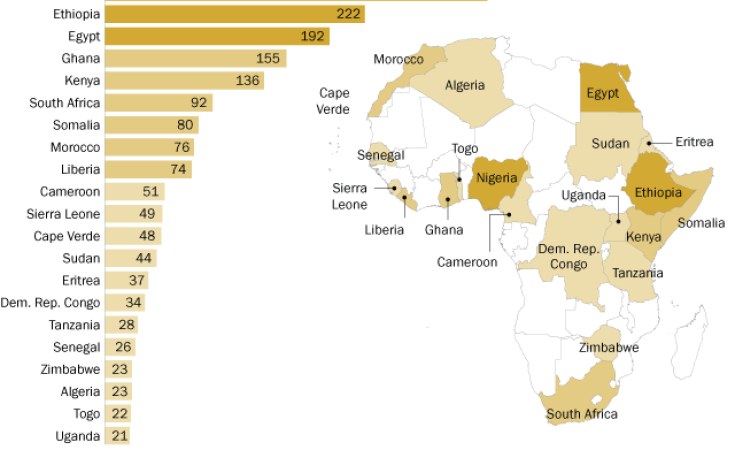Washington, DC — African immigrants to the United States account for less than five percent of the total, but they are better educated than most and their earnings are among the highest. African immigration is likely to decline, however, if a bill backed by two Republican U.S. Senators passes.
The "Reforming American Immigration for a Strong Economy (RAISE) Act," S. 1720 was introduced by Senator Tom Cotton (R) Arkansas and Senator David Perdue (R-Georgia) on 2 August. President Donald Trump backs the bill. It establishes a skills-based program where applicants get points for "education, English-language ability, high-paying job offers, age, record of extraordinary achievement, and entrepreneurial initiative."
Over 2.1 million African immigrants lived in the United States in 2015, according to the last U.S. census. They were 4.8% of the immigrant population – up from 1% in 1970. They are doctors, lawyers, engineers, professors and entrepreneurs, as well as refugees – many of whom are themselves highly skilled professionals.
The U.S. Census Bureau's America Community Survey showed from 2008-2012, 41% of foreign-born Africans had a bachelor's degree or higher, compared to 28% for all other immigrants. They are among the highest wage earners, they pay substantial taxes and they often fill jobs where there are critical shortages across the United States, such as in health care.
Today the United States is the number one destination for students from sub-Saharan Africa, ranking ahead of the United Kingdom. Over 31,000 Africans are presently enrolled in U.S. universities.
Those scholastic achievers can go elsewhere to be educated – and contribute billions of dollars to universities in other countries that compete for them. As actions against U.S.immigrants have grown, recruitment by other countries of those students, and the fees and expertise they contribute to national economies, has increased. Mounting racially charged rhetoric also is discouraging many potential immigrants.
The RAISE Act adds to the uncertainties that affect the decisions, along with the intentions, of students, business professionals and other Africans.
Many questions about the bill are unanswered. How are the points tallied? What proficiency in English is required? [According to a Migration Policy Institute report, more than 25 million people over the age of five in the United States were considered limited in English proficiency, and less than half of all immigrants in 2013 spoke English well.] What are the age limitations? What is the salary range for a 'high-paying' job? What constitutes 'extraordinary achievement'? How is entrepreneurial achievement measured – financially or by other criteria?
Another RAISE provision shows immigration preferences for spouses and minor children of U.S. citizens and legal residents, but it eliminates preferences for certain extensions and categories of adult family members. For people from countries where close familial ties are an inherent part of their upbringing, and where parents, grandparents and siblings are considered immediate family, getting immigrant status may mean a permanent separation from what they consider to be their nuclear family.
Among the most concerning provisions relating to Africans is the elimination of the Diversity Visa Lottery. The rationale for eliminating the Lottery – with 50,000 opportunities for visas annually – is that it had "no humanitarian or economic interest" and was "plagued with fraud." Both justifications are questionable and unproven. The Diversity Lottery gave people from underrepresented countries in Africa and other regions of the world a chance to obtain U.S. residency, while restricting the number of applicants from countries that already dominate immigration, such as India and China.
The bill's restriction of refugees to 50,000 may also affect Africans negatively. A recent Pew Research Center article, attributes the rise in the number of foreign-born Africans coming to the United States to the Refugee Act of 1960, which allowed entry to those escaping conflict in Somalia and Ethiopia. Africa's share of refugees rose from 1% in that period to 37% in 2016. Among arrivals in the U.S. last year were those from the Democratic Republic of the Congo, where more than five million people are estimated to have died in conflict in the past decade – largely outside media or policy attention.
The RAISE bill would alienate groups of individuals that would benefit the United States. While the preference for skilled workers is understandable, unskilled workers are also contributing in such sectors as agriculture and in a host of jobs that many Americans do not want or cannot fill.
The proposed legislation raises not only questions about what it portends for African and other immigrants. It raises questions about what it means for our country, for our economy, for the fabric of our nation that has always been interwoven with the abilities and innovations and cultures of those from many nations. It is that fabric that stands to be torn if this legislation passes.
RAISE would fragment our society internally, while, at the same time, lessening our reputation abroad. That type of raise America can do without.
Bernadette Paolo, a trained lawyer with extensive experience on Capitol Hill, is former President and CEO of The Africa Society and was a 2016 Harvard Advanced Leadership Fellow.


